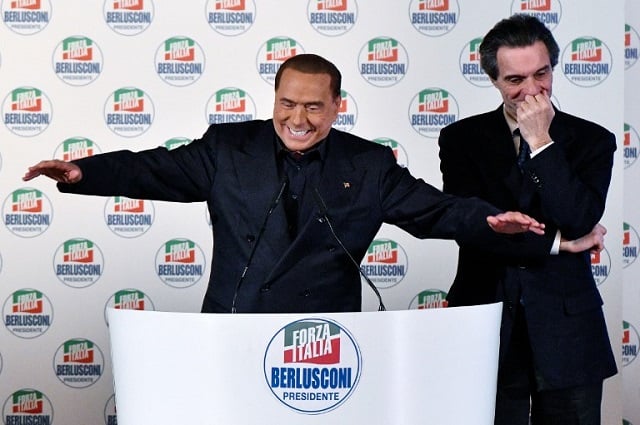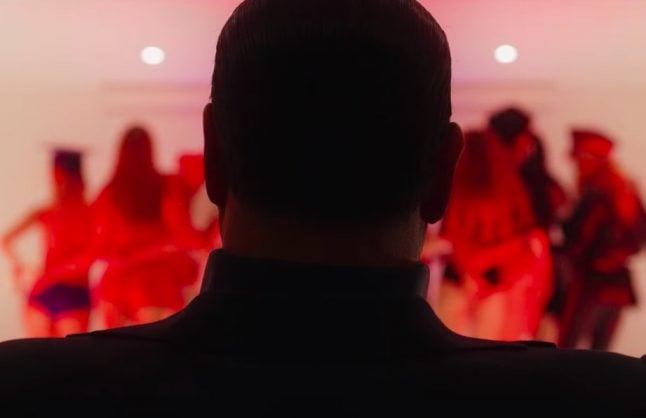When he was booted out of office in 2011, Silvio Berlusconi’s political career appeared to enter a new, and seemingly final, phase. He was occupied less frequently in setting the political agenda than in reacting to agendas set by others.
He was already elderly and support for his Forza Italia (FI) dwindled as the “anti-establishment” mantle was assumed by the Five Star Movement (M5s). Then, at the end of 2013, he was expelled from the Senate and banned from holding public office following a conviction for tax fraud.
Resigned to the fringes, Berlusconi’s role as the driving force in Italian politics was, until the end of 2016, assumed by the centre-left Democratic Party (PD) leader Matteo Renzi, with his constitutional reform agenda. But since then, his fortunes appear to have revived somewhat. So, with an election coming, is he about to make a political comeback?

Silvio Berlusconi. Photo: AFP
On the one hand, support for his party remains well below the levels seen in the past. Before the pre-election ban on the publication of poll results kicked in, it stood at 16.1%, which means Berlusconi continues to have to vie with the 44-year-old Matteo Salvini for leadership of the centre right. Salvini has succeeded in transforming the Northern League from a regional-autonomy party into a national populist force.
On the other hand, the rivalry between the two has become less arduous in recent months as polling results have seen Berlusconi’s party’s numbers slowly rise and place him, once again, in front of the League.
Whatever the outcome of this election, Berlusconi cannot assume the role of prime minister because of his conviction. However, there is even a question mark over that because the law banning him from office applies to offences he committed before it was introduced in 2012.
Berlusconi has appealed to the European Court of Human Rights arguing that the ruling contradicts the Italian Constitution, which provides that “no punishment may be inflicted except by virtue of a law in force at the time the offence was committed”. He also claims it contravenes a similar provision in the European Convention on Human Rights.
The elder statesman
The prospects of Berlusconi’s centre-right coalition emerging with an overall majority in this election look slim indeed. Given the electoral system, which distributes a third of the seats according to a first-past-the-post system, and given the showing of the M5s as a significant “third force”, the smart money is on none of the three main contenders emerging as an outright victor.
That said, Berlusconi has had a good campaign. He is clearly aware that, though he may no longer be at the centre of Italian politics, he might still act as kingmaker. Attempting to appeal to moderate voters put off by Salvini’s stridency, he has sought to project the image of a wise elder statesman who has turned his back on his flamboyant past. He has made pronouncements designed to reassure Brussels and the international financial markets.
It’s a far cry from the past. In 2002 he lost his foreign minister thanks to his attempts to capitalise on the initial stirrings of popular resentment about austerity, immigration and security, and to channel it in the direction of Brussels. But the transformation should not surprise – Berlusconi is a salesman, after all; campaigning is the activity at which he excels.
- Inside a campaign event with Berlusconi's supporters
- A history of Berlusconi's political gaffes
- Political cheat sheet: Understanding Forza Italia

Berlusconi with his coalition partners. Photo: Livio Anticoli/AFP
His coalition, as an electioneering entity, works very well. Its three main components each appeal to different varieties of more-or-less right-wing sentiment. So if he appeals to moderates, and Salvini to those with far-right, anti-immigrant views, his third ally, Giorgia Meloni and her Brothers of Italy, appeals to those for whom being on the right means a feeling of affinity with the ideals of national pride never entirely relinquished by the heirs of Mussolini. If the specific profile of each party potentially drives away voters, then the presence of one of the other two serves to reassure them and keep them on side.
And the barely hidden rivalry of the three putative allies has helped Berlusconi to keep his options open when it comes to the inter-party negotiations that will be needed to form a government after the election. If neither M5s, which is without allies, nor the centre left, which is hopelessly divided, have realistic prospects of forming the next government, then the only alternative will be a more-or-less grand coalition. As things currently stand, the most viable option for that appears to be one based on an arrangement between Forza Italia and the Democratic Party.
![]() So as he continues to compete for an overall majority, Berlusconi is aware that in the event of failure, he might abandon his more extreme partners for an arrangement that would still place him close to the centre of power. Love him or loath him, then, his reputation as one of Europe’s most remarkable politicians of recent decades remains fully deserved.
So as he continues to compete for an overall majority, Berlusconi is aware that in the event of failure, he might abandon his more extreme partners for an arrangement that would still place him close to the centre of power. Love him or loath him, then, his reputation as one of Europe’s most remarkable politicians of recent decades remains fully deserved.
James Newell, Professor of Politics, University of Salford
This article was originally published on The Conversation. Read the original article.




 Please whitelist us to continue reading.
Please whitelist us to continue reading.